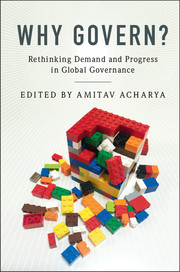Book contents
- Frontmatter
- Contents
- List of Figures
- List of Tables
- Notes on Contributors
- Acknowledgments
- List of Abbreviations
- 1 Rethinking Demand, Purpose and Progress in Global Governance: An Introduction
- Part I The Changing Concept of Global Governance
- Part II Issue Areas
- 5 Conflicts and Security
- 6 Human Rights
- 7 Atrocity Crimes
- 8 Trade
- 9 Finance
- 10 Climate
- 11 Refugees
- 12 Health
- 13 Cyberspace and Social Media
- 14 The Contested Quest for Global Governance: Conclusions and Directions for Further Research
- Bibliography
- Index
8 - Trade
from Part II - Issue Areas
Published online by Cambridge University Press: 05 September 2016
- Frontmatter
- Contents
- List of Figures
- List of Tables
- Notes on Contributors
- Acknowledgments
- List of Abbreviations
- 1 Rethinking Demand, Purpose and Progress in Global Governance: An Introduction
- Part I The Changing Concept of Global Governance
- Part II Issue Areas
- 5 Conflicts and Security
- 6 Human Rights
- 7 Atrocity Crimes
- 8 Trade
- 9 Finance
- 10 Climate
- 11 Refugees
- 12 Health
- 13 Cyberspace and Social Media
- 14 The Contested Quest for Global Governance: Conclusions and Directions for Further Research
- Bibliography
- Index
Summary
Many analysts of global governance look to the World Trade Organization (WTO) as particularly effective and important because its treaties are enforceable. Legal scholars distinguish the enforceable hard law of the WTO from the less constraining soft law that dominates the international arena. However, in recent years states have failed to make substantial progress in the Doha Round of multilateral negotiations and increasingly are negotiating plurilateral trade deals outside of the WTO. It is unclear how these plurilateral agreements such as the Anti-Counterfeiting Trade Agreement (ACTA), the Trans-Pacific Partnership, and US-EU Transatlantic Trade and Investment Partnership negotiations will mesh with existing multilateral institutions. Trade economist Jagdish Bhagwati bemoans the forum proliferation and regime complexity (or “spaghetti bowl”) governing trade issues. At the December 2015 WTO Ministerial meeting in Nairobi, trade ministers failed to agree to continue negotiating the Doha Round. This deeper multilateral stalemate worries proponents of trade liberalization, who emphasize how trade liberalization has pulled many millions out of poverty and fueled the emerging markets of China, India and Brazil.
Hard feelings remain in the wake of the Uruguay Round of trade negotiations over broken promises and costly demands. Two of the touchiest issues are agricultural trade and intellectual property, the latter of which Bhagwati argues has turned the WTO into a royalty collection agency for OECD-based firms. The quid pro quo in the Uruguay Round was that developing countries would accept an Agreement on Trade-Related Aspects of Intellectual Property (TRIPS) in exchange for expanded market access for developing countries’ textile and agricultural exports. The OECD countries have yet to fulfill the agricultural market access end of the bargain. At the disastrous 2003 Cancun trade negotiations then-United States Trade Representative Rob Portman blamed developing countries for the impasse and made a clear distinction between the “can do” and the “won't do” countries. By the same token, China, India and Brazil are gaining greater influence commensurate with their rising economic clout.
The multilateral impasse and the growing assertiveness of China, India and Brazil have prompted continuous forum shopping and shifting. The United States and the EU have engaged in extensive bilateral and plurilateral negotiations seeking to achieve deals that they could not achieve multilaterally. This exercise in vertical forum shifting not only weakens multilateral governance institutions, but also raises important concerns about legitimacy. These concerns are particularly sharp in both intellectual property and agriculture.
Information
- Type
- Chapter
- Information
- Why Govern?Rethinking Demand and Progress in Global Governance, pp. 157 - 173Publisher: Cambridge University PressPrint publication year: 2016
